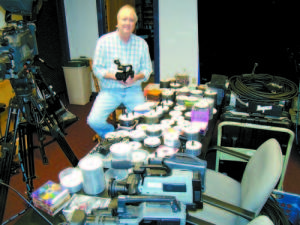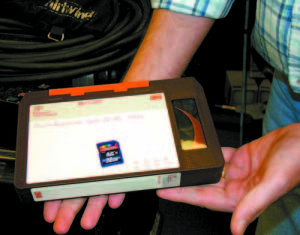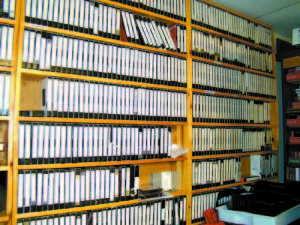LRTV embraces the digital age
By Gail Geraghty
Staff Writer
For years, despite its modest $70,000 annual budget, Lake Region Television has had the distinction of offering its viewers more local programming than any other TV station in Maine.
And now, with the purchase of new all-digital equipment, the station is delivering that programming live, both via cable and the Internet, in a decidedly smoother, more professional manner.
The digital transition, two years in the making, is nearly complete, with three new $3,500 high-definition cameras linked to Internet-capable computer servers in LRTV’s headquarters in the basement of the Bridgton Municipal Complex.
With the push of a button, the cameras send their audio/video signals to the server, and the show is streamed live over the Internet, anywhere in the world. Just as the VHS tapes once used by the station are obsolete, so, too, now are DVDs. All the shows are stored on the computer servers with removable hard drives. When one drive fills up, it can simply be replaced.
No more sitting at the station, waiting (in real time) for a camera’s video tape from a two-hour meeting to be copied onto a DVD before it can be edited for viewing. No more awkward station pauses of up to a minute between shows, while a machine sorts out the next DVD to load up in the queue.
No more moving parts.

WHY IS THIS MAN SMILING? — The $3,500 high-definition video camera held by Lake Region Television Manager John Likshis contains a small card that replaces everything on the table in front of him — making DVDs and taped video cameras obsolete. “We may start a museum,†he jokes. (Geraghty Photos)
In the past, live shows were only possible from the selectmen’s rooms in the towns of Bridgton and Naples. Now, thanks to a nifty camera device called a Mi-Fi that links to the signal of a portable antennae, LRTV can go live virtually anywhere, within a quarter-mile of a WiFi hot spot.
That’s how LRTV was able to provide live coverage of Bridgton Veterinary Hospital’s recent Pet Community Event, using the hospital’s wireless Internet signal. That’s also how the station was able to provide live coverage of Lake Region High School’s Girls Basketball finals at Cape Elizabeth — although the live signal crashed at halftime because bandwidth dropped when too many others began texting and using their mobile devices.
A $25,000 grant from the Kendal C. and Anna Ham Charitable Foundation was secured by LRTV Board Chairman Paul Kucharski this April, and “really got us going†on the digital transition, said Manager John Likshis. At least that much was matched by the station’s own resources, not enough to do everything they wanted, but enough to be able to comfortably say that the station is — at long last — up-to-date on technology.
The Bridgton News talked recently about the digital transition with seven-year LRTV Manager John Likshis, a veteran of Maine Public Broadcasting whose fascination with all things camera dates back to his high school days:
BN: Why go digital?Â
JL: “As Time Warner has changed over to digital, so we, too, are going with the change. The technology has become cheap enough that, via the Internet, we can go live almost anywhere where we can get an Internet connection. There aren’t any FCC (Federal Communications Commission) regulations on wideband connections, but of course we always ask permission.â€
BN: Why did it take two years?
JL: “The first was financial, but the biggest reason is, the pace of change with technology is just overwhelming. So we didn’t want to jump in too early. The equipment we had, we wanted to keep working, to keep us financially and technically secure for at least two years. We already know there’s another change coming up in the future. This will hold us hopefully for the next three years — when we’ll have to change again. This grant gave us the first step. We’re totally off DVDs and old VHS tapes. And very rarely do we go in the field now with taped cameras. Those cameras are all being retired; they’ve been repaired so often they’re to the point now where very few are working. They don’t have any value to someone else because the tapes they use, the decks are no longer available. They were calling them digital cameras but they were recording them to a tape medium. Our three new high-definition cameras are true digital cameras. They come with a four-hour memory card that just slips in, and (when we’re done taping) we put the card into a computer and just drag and drop the (video) file.â€
BN: What will you do with the old cameras?
JL: “We can still use them for recording meetings or other non-live coverage. The new cameras are used for live coverage. But the old cameras? Maybe we’ll donate them to a museum.â€
BN: How does having Internet access help with programming? Â
JL: “We’re able to record our shows via the Internet. So when were sending out any kind of live meeting, were recording it at the same time onto a server at Livestream, and we have it immediately available for playback on the Web. So somebody who went to the Casco Days Parade, for example, when it was over, they could call it right up on their computer or their mobile device, and watch the parade that just went by.â€
BN: How long will the show stay on the Internet?
JL: “We can archive them indefinitely. A municipal meeting will stay on a long time. A parade might have a shorter shelf life. That’s one of the other advantages of the emerging technology — the storage space has become huge. The old floppy disks were — what — a couple of megabytes? Now were talking about terabytes (1,000 gigabytes). You can put hundreds and hundreds of hours of video on the computer. And all of the drives we have now are also removable. So we can remove them when they fill up, and put a new one in.â€
BN: If someone wanted to watch a parade a few years from now, could they?
JL: That’s a process we’re still evolving. We just create so much programming. We’re not making DVDs any longer. (Once the show is removed from the LRTV website), copying it means we’d have to bring it out of the cablecast tightrope server and create a DVD from that — and that’s a lot of extra man hours. Previously we made a copy, and just made a copy of that, and charged $9. If we continue to charge the same price, we’re spending a couple of hours for $9. We’re trying to figure out how to make it cost effective for someone who wants that (a program no longer stored on the website). A lot of people have been extremely happy with being able to see an event on the website. We’ve subscribed to Livestream for livestreaming, and we can archive those programs. Any taped programs we feel are beneficial, we’re uploading to a service called Vimeo, where people can go on and search for video on demand. And that also offers them the option to download the video and make their own DVD at home. Anything initially we create and put on the air will be on the server until the server fills up. When it fills up, which may be a year from now, we’ll have to make a decision then whether we delete some of the programs. We can keep the (programs) we deem historical, or just buy a new drive.
BN: How will technology change again in the next few years?
JL: “Our back room is still full of VHS tapes, even though we’ve begun throwing stuff away from 10 years ago. We’ve offered it to various towns, but often they say they don’t have the storage space. We’ll archive some of the DVDs. But here’s the problem. People can’t play VHS tapes because they don’t have VHS players anymore. And the same thing will happen with DVDs, because they’ve already gone beyond plain DVDs to Blu-ray. And Blu-ray has moved on to where everything is being streamed and archived. I think someday everything that we watch will be on demand.â€



